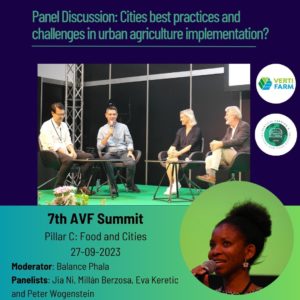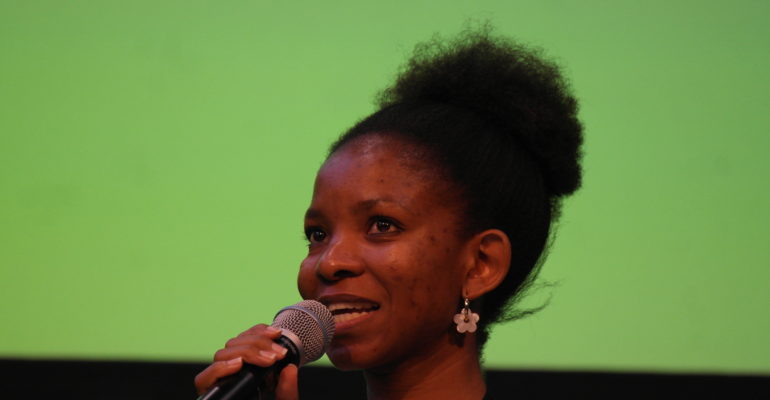📣 In a recent panel discussion moderated by Balance Phala from ICLEI, experts Jia Ni from FAO, Eva Keretic from the future food campus Hamburg, Millán Berzosa from ISIFARMER and Peter Wogenstein from food council niedersachsen shed light on the critical role of sustainable food systems and urban agriculture. Here’s a snapshot of key takeaways:
- Food systems transformation for Sustainable Cities: Balance Phala briefly spoke about the Global CityFood program, specifically highlighting the SchoolFood4Change project, where she emphasized the importance of influencing children to choose sustainable food, recognizing it as a pivotal step towards meeting the needs of our urban centers. In addition she indicated that food systems transformation in cities can be accomplished through collaborative problem solving and co-creation of knowledge, citing the AfriFOODlinks project as an illustrative example.
- Revolutionizing the Food System: Eva Keretic highlighted the alarming environmental impact of the livestock industry and food waste. She discussed the mission of the Future Food Campus, which aims to promote climate-positive food systems. Approval of cultivated meat in the USA and Singapore is a significant step towards this goal.
- Challenges in Vertical Farming: Jia Ni addressed the challenges faced by vertical farming, including cost estimation issues and the need for better urban planning that involves urban farmers. Stakeholder engagement is essential for integrating vertical farming into cities.
- Empowering Food Democracy: Peter Wogenstein shared insights into the global Food Policy Council movement, emphasizing the need for action at the local level. He called on citizens to engage with their local councils to address issues like food insecurity and waste.
- Bringing Agriculture Closer to Cities and the End Consumer: Millán Berzosa presented a vision of innovation, drawing inspiration from Madrid’s potential, to find more efficient ways of connecting urban consumers with urban farmers. He emphasized the importance of simplifying technology and going back to basics, for example, via well-established tools like QR codes, to enhance trust and traceability. Millán also underscored the critical role of community engagement in this effort. When discussing Diversity, Equity, and Inclusion (DEI), he pointed out the importance of ensuring that opportunities are accessible to all.
- Reimagining Urban Spaces: Panelists explored creative ways to incorporate urban farming into existing structures, like repurposing old factories and brownfields. Funding and administration support are essential for such transformations.
- Tackling Food Insecurity: Jia Ni proposed using vertical farming in conflict regions to provide fast-growing food options. This could be a vital step in addressing food shortages in these areas.
- The Future of Urban Farming: The panel questioned why empty urban spaces, including large rooftops and underutilized buildings, are not being leveraged for sustainable food production. Administrative readiness and collaboration with local municipalities are essential.
- Building a Sustainable Future: The discussion revolved around creating a compelling vision for the future of agriculture and the need for public-private partnerships to fund sustainable initiatives.
📢 Call to Action: The panelists stressed the importance of getting vertical farming on the agenda of cities and towns. Engage with local municipalities and advocate for sustainable food systems. Collaboration and collective efforts are key to making a meaningful impact.
🤝 Let’s join hands and work towards a more sustainable future, where our cities thrive with eco-friendly food systems. ICLEI Global CityFood Program, AfriFoodLinks, ISIFARMER, FAO, future food campus Hamburg, food council Niedersachsen with these experts’ insights are driving this change.
Together, we can create a positive impact! 💚🌍🏗️




Comments are closed.